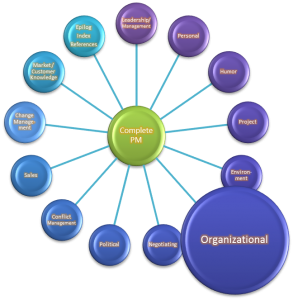A complete project manager realizes the organization is the place where all work happens and has an indelible impact on how work progresses. Seek alignment among strategy, execution, structure, cultures, and the portfolio of projects.
An imperative facing complete project managers in all organizations is not only to embark on a quest to manage project management processes, but also to execute projects within “green” organizations that encourage project-based work. A “green” organization is better positioned not only to survive but to prosper, even in difficult times.
To reach this state, leaders need to eliminate pollutants and “toxic” actions that demotivate people and teams. It also means that those people on this path search with unrelenting curiosity for leading practices. A “leading practice” is a process, action, or procedure that has not yet gained recognition as a best practice but it shows great potential as a better way to structure the organization and optimize results from project-based work. When these practices are revealed to you, it requires that you be prepared to take action.
Usage of “green” terminology in this context extends the physical, tangible thinking about our environment into the non-physical, intangible relationships that affect working environments among people in an organization. In this sense, “green” is good, productive, and desirable, allowing people to work as natural, organic living systems are intended to do. Examples would be:
- trust among colleagues and management is ever present
- cooperation instead of competition is the norm
- a common sense of purpose provides sustenance and meaning to all activities
- a shared vision brings clarity to the direction of work
- people fully communicate with each other regularly
- individuals are respected, able to express their creativity, and have power to influence others through positive persuasive techniques
On the other hand, “toxic” working environments are permeated by mistrust, failures to communicate, burdensome reporting requirements, misguided metrics, and cutthroat tactics. Negative political practices create uneasiness and frustration among all except those who wield them with power.
A toxic element might be managers who barely understand or appreciate the project management process, and they make demands or decisions that are short-sighted. A green element is leaders who engage their people in open discussion, and possible dissent, to determine the best way to proceed on a complex project.
We believe these “green” aspects are necessary for complete project managers to buy into, create, and support. Without this approach, people and organizations are often doomed to failures, overruns, and dissatisfied stakeholders. Each person has the power within him or her to embrace this thinking and act upon it every day.
Randy Englund, Englund Project Management Consultancy, www.englundpmc.com

